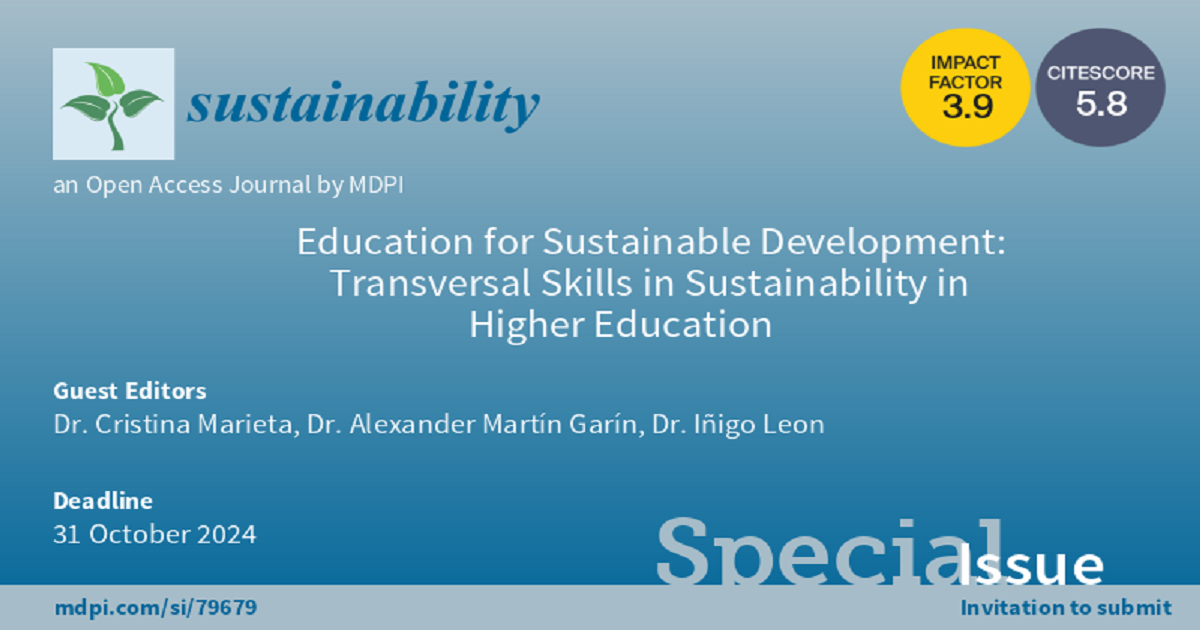Education for Sustainable Development: Transversal Skills in Sustainability in Higher Education
A special issue of Sustainability (ISSN 2071-1050). This special issue belongs to the section "Sustainable Education and Approaches".
Deadline for manuscript submissions: closed (31 October 2024) | Viewed by 27113

Special Issue Editors
Interests: composite materials; cements; limes and other hydraulic binders; life cycle assessment (LCA); spectroscopic techniques and microscopies: OM, SEM and AFM; education for sustainable development (ESD)
Interests: energy efficiency in buildings; energy monitoring of buildings; energy simulation of buildings; thermographic and air tightness analysis in buildings; diagnosis and energy optimisation of heritage buildings; development of instrumentation based on open source platforms (OSP) and the internet of things (IoT)
Special Issues, Collections and Topics in MDPI journals
Interests: Education for Sustainable Development (ESD)
Special Issue Information
Dear Colleagues,
One of the targets for the Sustainable Development Goals announced by the United Nations in 2015 aims to ensure that all learners acquire the knowledge and skills needed to promote sustainable development. In this context, with universities being a subsystem of society and oriented by its needs, values, and norms, a slow and laborious process of change is foreseen. It is time for key changes in methods, form, and instruments—perhaps it is the most propitious moment to not return to stereotypical and routine study that is market-driven without connection to the community, human beings, and nature. Education for sustainable development, ESD, prepares learners to understand and respond to the changing world and drives sustainable development. It produces learning outcomes that include core competences, which can be summarized as twelve competences: systems thinking; interdisciplinary work; anticipatory thinking; justice, responsibility, and ethics; critical thinking and analysis; interpersonal relations and collaboration; empathy and change of perspective; communication and use of media; strategic action; personal involvement; assessment and evaluation; and tolerance for ambiguity and uncertainty. Thus, to develop these new competences, new pedagogical approaches have been incorporated. Therefore, the purpose of the Special Issue is that university professors who are working in this regard present their contributions, focusing especially on technical studies, engineering, and architecture. Techniques such as brainstorming, peer assessment, problem-based learning, collaborative learning, online discussion forums, games and systems simulations, among others [1–4] can be found in literature. With this proposal, this area, so interesting and fundamental for the future of universities, would be notably enriched.
- Lambrechts, W.; Mulà, I.; Ceulemans, K.; Molderez, I.; Gaeremynck, V. The integration of competences for sustainable development in higher education: an analysis of bachelor programs in management. Clean. Prod. 2013, 48, 65–73, doi:10.1016/j.jclepro.2011.12.034.
- Cotton and J. Winter, “It´s not just bits of paper and light bulbs: A review of sustainability pedagogies and their potential for use in higher education” in Sustainability Education: Perspectives and Practice across Higher Education. Jones, P., Selby, D., Sterling, S., Eds., Earthscan: London, UK; New York, NY, USA, 2010.
- Murga-Menoyo, M. Ángeles Learning for a Sustainable Economy: Teaching of Green Competencies in the University. 2014, 6, 2974–2992, doi:10.3390/su6052974.
- Segalàs, J.; Balas, D.F.; Mulder, K.F. What do engineering students learn in sustainability courses? The effect of the pedagogical approach. J. Clean. Prod. 2010, 18, 275–284, doi:10.1016/j.jclepro.2009.09.012.
Dr. Cristina Marieta
Dr. Alexander Martín Garín
Dr. Iñigo Leon
Guest Editors
Manuscript Submission Information
Manuscripts should be submitted online at www.mdpi.com by registering and logging in to this website. Once you are registered, click here to go to the submission form. Manuscripts can be submitted until the deadline. All submissions that pass pre-check are peer-reviewed. Accepted papers will be published continuously in the journal (as soon as accepted) and will be listed together on the special issue website. Research articles, review articles as well as short communications are invited. For planned papers, a title and short abstract (about 100 words) can be sent to the Editorial Office for announcement on this website.
Submitted manuscripts should not have been published previously, nor be under consideration for publication elsewhere (except conference proceedings papers). All manuscripts are thoroughly refereed through a single-blind peer-review process. A guide for authors and other relevant information for submission of manuscripts is available on the Instructions for Authors page. Sustainability is an international peer-reviewed open access semimonthly journal published by MDPI.
Please visit the Instructions for Authors page before submitting a manuscript. The Article Processing Charge (APC) for publication in this open access journal is 2400 CHF (Swiss Francs). Submitted papers should be well formatted and use good English. Authors may use MDPI's English editing service prior to publication or during author revisions.
Keywords
- sustainable development
- pedagogical approach
- higher studies
Benefits of Publishing in a Special Issue
- Ease of navigation: Grouping papers by topic helps scholars navigate broad scope journals more efficiently.
- Greater discoverability: Special Issues support the reach and impact of scientific research. Articles in Special Issues are more discoverable and cited more frequently.
- Expansion of research network: Special Issues facilitate connections among authors, fostering scientific collaborations.
- External promotion: Articles in Special Issues are often promoted through the journal's social media, increasing their visibility.
- e-Book format: Special Issues with more than 10 articles can be published as dedicated e-books, ensuring wide and rapid dissemination.
Further information on MDPI's Special Issue polices can be found here.






